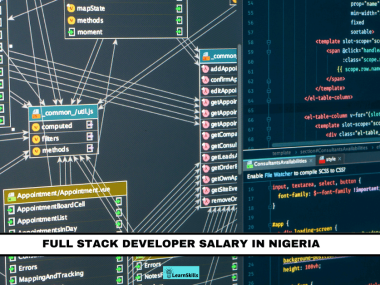All university programmes do not have equal popularity. Some are simply more popular than others.
This happens for various reasons like how young admission seekers perceive the profession. What most young students find attractive about university degree programmes is the job prospects and earning potential such programmes give.
Medicine and surgery, Law, Accounting and Pharmacy are some of the favourites of admission seekers in Nigeria. But what many fail to realise is the earning potential of starting a career in banking and finance.
If you are contemplating if banking and finance is a course you should study, this article would explore the possibilities a degree in banking and finance presents
About banking and Finance
Banking and finance programmes are offered by various universities in Nigeria. The Nigerian financial services sector contributed about N3.8 trillion to Nigeria’s GDP in 2023. It is expected to grow at a CAGR of 2.76% between 2024 and 2028. This means more jobs and career opportunities for people in this sector.
The Banking professionals are regulated by the Chartered Institute of Bankers of Nigeria. But the financial sector has many regulators including the CBN (Central bank of Nigeria) that regulates banks and other financial institutions in the country, the SEC, the federal ministry of finance, Nigerian Deposit Insurance Corporation (NDIC)
Is banking and finance a good course?
Yes. Banking and finance is a good course to study in Nigeria. The main reason is that the knowledge of finance would give you a clear advantage in the world of business and investment.
Whether you want to fund your new business venture or invest in the financial markets, knowledge of banking and finance would prove to be very useful.
All these benefits are besides career opportunities available for skilled finance professionals and their earning potential.
How much do bankers earn?
Let us go over how much entry level bankers earn in different banks in Nigeria.
| S/N | Bank | Average monthly salary |
| Access Bank | N237,000 | |
| Zenith Bank | N110,000 | |
| First Bank | N168,000 | |
| FCMB | N115,000 | |
| Central Bank of Nigeria | N122,000 | |
| Guaranty Trust Bank | N209,000 | |
| UBA | N180,000 | |
| Stanbic IBTC | N193,000 | |
| Sterling Bank | N145,000 | |
| Keystone Bank | N75,000 | |
| Union bank | N142,000 | |
| Fidelity Bank | N140,000 |
Note that these figures are not fixed because there are different entry level points in banks and the salaries vary slightly based on the job title.
However, these are confirmed averages gotten through my conversations with bank workers in Nigeria.
What do bankers actually do?
Below are some of the important roles of bankers ;
- Bankers collect, store and analyse information about new and existing clients.
- Building relationships with the customers of the bank in order to encourage them to use the bank’s products.
- Open new bank accounts for new customers, provide related services like requesting for debit cards.
- Monitor transactions on the client’s bank account, take appropriate action if or when fraudulent activities have occurred.
- Process electronic banking application.
Can you become a millionaire if you study banking?
Yes, you can become a millionaire if you work successfully in banking. In fact many successful bankers have gone on to become some of the richest people in the country. This is particularly true for people who are founders of banks and own a significant amount of shares in their banks.
It is also possible to start out as a banker, rise through the ranks to become a c level executive earning a sizable salary and compensation which can make you rich.
Benefits of studying banking and finance
There are several benefits of studying this course in Nigeria. Some people believe that getting a banking and finance degree is a waste of time. This is not true.
Some of the benefits include;
- Opportunities to get well-paying jobs in the vast Nigerian financial sector. This is not limited to bank jobs alone. Finance professionals can work in large corporate entities, investment banks, private equity, Insurance, etc.
- You would gain knowledge that would be useful in making investment decisions that can translate into personal profit.
- Learning about banking and finance would give you the analytical and business skills to manage the finances of clients. This might also benefit you on a personal level.
- There are opportunities to start your own business. With a strong finance background and relevant qualification, you can start your financial consulting, tax consulting, FinTech etc.
Top 10 best banking and finance programmes in Nigeria
If you want to know the best universities that would prepare you for a career in banking and finance, then this list would act as a guide.
Methodology: I have ranked this list based on the quality of research, teaching and reputation of the faculty delivering these lectures. I also focused on universities that offer a first degree programme
The top 10 universities offering banking and finance in Nigeria include;
#1. University of Lagos
#2. University of Nigeria, Nsukka
#3. Covenant University
#4. University of Ilorin
#5. Nnamdi Azikiwe University
#6. Ahmadu Bello University
#7. University of Port Harcourt
#8. University of Benin
#9. University of Calabar
#10.Pan Atlantic University
Cut off mark for banking and finance at top Nigerian Universities
Let us go over the latest cut off marks for banking and finance in these universities below.
| S/N | University | UTME Cut off mark (2023/2024) |
| 1 | University of Lagos | 200 |
| 2 | University of Nigeria, Nsukka | 180 |
| 3 | Covenant University | 180 |
| 4 | University of Ilorin | 180 |
| 5 | Nnamdi Azikiwe University | 160 |
| 6 | Ahmadu Bello University | 180 |
| 7 | University of Port Harcourt | 150 |
| 8 | University of Benin | 200 |
| 9 | University of Calabar | 140 |
| 10 | Pan Atlantic University | 220 |
Admission requirements for banking and finance
The specific admission requirements might vary with university but generally the following is usually required;
- 5 credit level passes in O’level which includes Mathematics, English Language and any other relevant subjects or 2 A’ level passes in either Accounting, Management, Mathematics, Economics, Statistics or Geography.
- UTME subjects for Banking and Finance are English Language, Economics, mathematics with either government or geography.
- You also have to meet screening requirements of the university you applied to.
Frequently Asked Questions
Let us go over some frequently asked questions you might have about studying banking and finance.
How many banks are there in Nigeria?
There are currently 25 commercial banks in Nigeria licensed by the CBN. You can find a list of the banks here.
How much is a banking licence in Nigeria?
For a regional banking licence, the minimum paid-up share capital should be about N10 billion, for a national bank it is N25 billion while for an international commercial bank, it is N50 billion.
How do banks make money?
Banks primarily make money through giving out loans and earning an interest on such loans. They also make money by trading in the financial markets and other investments.
Can I switch from banking and finance to accounting?
Yes it is possible to switch from banking and finance to accounting. It depends on your department’s requirements.
You can also work as an accountant with your Banking and finance degree if you take and pass your ICAN qualifying exams.
Which banking job is best?
There are vast opportunities in the financial sector, all of which come with various benefits. However, working as a permanent staff of a major bank in Nigeria can prove to be lucrative.
Working as a banking officer under such a contract would give you the opportunity to utilise the skills you have acquired while studying banking and finance directly in real life.











2 comments
thanks
Can I study banking and finance in aksu with 164 score